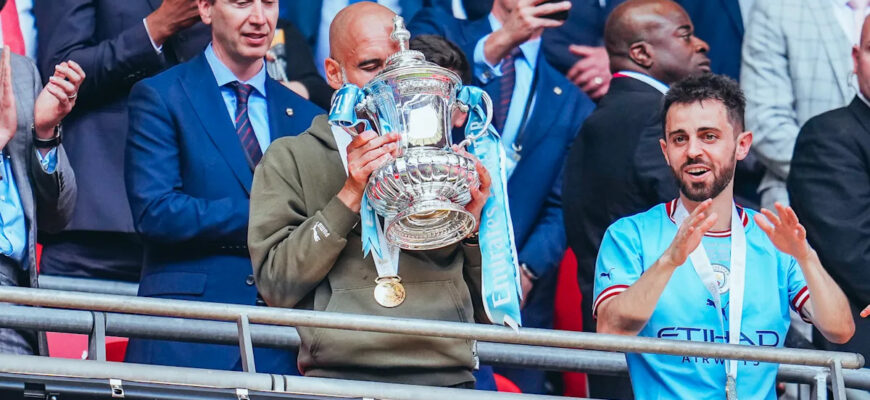The final whistle had barely pierced the din of Wembley, signaling an unexpected end to Manchester City`s FA Cup aspirations. For a club that had redefined dominance in English football, a defeat in a major final is a rare and jarring occurrence. As Manchester United players erupted in joyous celebration, their cross-city rivals faced the bitter taste of a season that, by their own stratospheric standards, felt undeniably incomplete. At the center of this maelstrom of emotions was Pep Guardiola, a manager known for his meticulous preparation and often stoic demeanor, who, in the immediate aftermath, offered a rare glimpse into the intense frustration that simmers beneath the surface of elite football.
A Rare Crack in the Facade
The post-match scene is often a tableau of contrasts: ecstatic winners and crestfallen losers. On this occasion, amidst the handshakes and media obligations, a particular moment unfolded that captured the competitive fire still burning fiercely within Guardiola. While the official reports may not detail a full-blown confrontation, observant eyes noted a palpable displeasure emanating from the City manager. His animated gestures and pointed remarks, reportedly directed towards perceived tactical delays and time-wasting from the opposition, suggested a profound dissatisfaction that went beyond merely losing a match. It was an exhibition of human emotion, raw and unedited, from a figure often seen as the embodiment of tactical perfection.
For a manager who has built a dynasty on fluid attacking football and relentless pressing, anything that disrupts the rhythm of the game can be a source of deep vexation. His frustration, though perhaps an understandable human reaction to defeat, inadvertently highlighted the psychological warfare that defines high-stakes football. The subtle artistry of slowing the game down, the strategic pauses – these are elements Guardiola has long railed against when employed by his opponents. In the heat of such a pivotal moment, with the FA Cup slipping away, the desire for pure, unadulterated football seemed to override diplomatic pleasantries.
“Winning is not everything, but wanting to win is.” – This unofficial motto of many top coaches finds its most vivid expression in moments like these, where the desire for victory collides with the harsh realities of competition.
A Season of Unsettled Expectations
To characterize Manchester City`s 2023-2024 season as a failure would, for many clubs, be an absurd overstatement. Securing a historic fourth consecutive Premier League title is an achievement that defies belief. Yet, for City, and especially for Guardiola, the season concluded with a nagging sense of missed opportunities. The Champions League, the ultimate European prize, saw them fall to Real Madrid in a dramatic quarter-final. And then, the FA Cup final loss to their cross-town rivals, Manchester United, served as an emphatic, if unwelcome, coda.
The original narrative suggested this was Guardiola`s “worst season.” While such a claim might prompt a wry smile from managers enduring genuine struggles, it speaks volumes about the impossible standards set at the Etihad Stadium. When the baseline is a treble, anything less is scrutinised with an almost surgical intensity. This season, despite its triumphs, lacked the overwhelming dominance and the clean sweep of trophies that had become almost an expectation. The Community Shield, mentioned as their sole “joy” in some reports, truly underscores the unique predicament of a club that operates on a different plane of ambition.
The Weight of Perfection: A Manager`s Burden
Guardiola`s visible vexation at Wembley was more than just a momentary lapse; it was a testament to the immense psychological burden shouldered by managers at the pinnacle of the sport. Every decision, every result, every perceived injustice is magnified under the relentless glare of public scrutiny. For a tactician of his caliber, whose entire philosophy revolves around control and precision, the elements of the game that elude his grasp – be it an opponent`s resilience, a referee`s call, or, indeed, time-wasting – can be profoundly exasperating.
There`s a subtle irony in watching a manager, whose team boasts a seemingly endless reservoir of talent and financial might, react with such raw indignation. It`s a reminder that even at the apex of professional football, where every aspect is meticulously analyzed and optimized, the human element—the passion, the frustration, the sheer will to win—remains powerfully undiluted. It`s what makes the beautiful game so compelling, offering moments where the curtain of professionalism is momentarily pulled back, revealing the intensely competitive spirit that drives these giants of the sport.
Looking Ahead: The Relentless Pursuit
As the dust settles on another tumultuous football season, Guardiola and Manchester City will undoubtedly engage in their customary introspection. While the FA Cup defeat may sting, and the Champions League exit a lingering disappointment, the Premier League title once again affirms their domestic supremacy. Yet, the memory of that final whistle, and Guardiola`s reaction, will serve as a stark reminder that even for the most successful, perfection remains an elusive, ever-moving target. The pursuit, however, continues – relentless, demanding, and occasionally, beautifully human in its imperfection.








